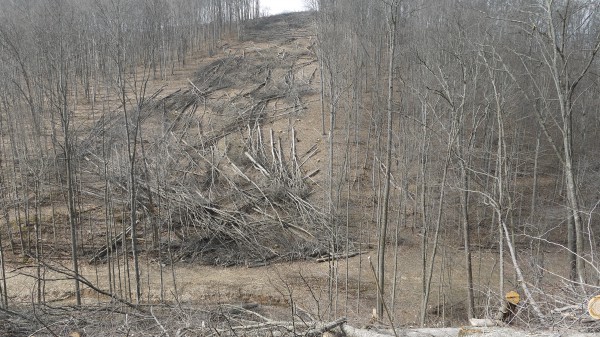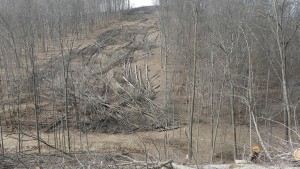
Lewis County, WV on March 25, 2015: Clearing underway for the 36-inch-diameter Stonewall Gas Gathering LLC pipeline. Stonewall is a subsidiary of Momentum, which has offices in Durango and Huston. The proposed Atlantic Coast Pipeline would be 42-inches in diameter and traverse much steeper terrain. Photo by Vivian Stockman.
Update: April Keating reports that FERC has informed her that people can make comments to FERC up until the day a pipeline is approved. So, continue piping up! FERC is especially looking for comments during the EIS period, which is the time the agency is trying to identify problems. Pipe up!
In late March, in Elkins and Bridgeport, WV, FERC held two public scoping meetings on the proposed massive Atlantic Coast Pipeline and the Supply Header Pipeline.
Harrison County resident Linda Ireland, an OVEC member, delivered these comments to FERC at the Bridgeport meeting on March 24:
I live in what was once a quiet rural West Virginia community where hydraulic fracturing for natural gas and the accompanying compressor stations, pipelines, and processing plants are rapidly spreading and transforming our community.
Countless studies show the negative health and environmental impacts of this kind of gas development, but experiencing these impacts are real people, and that can’t be understood by reading a report.
This winter, as bad weather and low gas prices slowed gas development activity, many of us experienced a delusion of reprieve—we hoped against hope that maybe it would stop and everything would be alright after all.
As the activity resumes, we realize we need a real reprieve, not a delusion. But if pipelines like the Dominion Atlantic Coast are approved, we will see an endless intensification of drilling activity and its impacts as the pipeline opens a virtually unlimited market for the natural gas lying beneath our homes.
To understand what that means I’d like to give you an analogy: Imagine we put you in a little shack with a window where you could watch as your home and everything that’s precious to you is bulldozed and burned. All you can do is watch and listen and breathe in the smoke. For us who live in West Virginia’s rural areas, the land is our home. To see it destroyed is destroying us. We love this land—the hills and creeks, trees and wildlife, our gardens and farms, the fresh air and the quiet. I don’t have a big fancy house, but when I walk out my door it’s like Yosemite National Park—without the crowds. We live surrounded by beauty. To protect that is all we ask.
Many have suggested we accept gas development and the proposed pipeline because of the jobs it brings. I raised two children here, and yes, I would love it if they could stay and make a decent living here. But not if they must risk their health working with hazardous materials. Not if their work would contribute to destroying the quality of life of fellow community members. Not if their work is harmful to the water, air, and ecosystems that sustain us. No job is worth what this pipeline and accompanying gas development will destroy.
So in considering the impacts of this pipeline, please also consider the impacts of the intense gas drilling and fracking that it will foster. We who live in the drilling areas know that natural gas is not a clean energy alternative. We should not permit the development of a pipeline that will support it.
You have until April 28 to file written comments with FERC on this proposed pipeline. Details on filing written comments, along with suggested topics to cover, are here. More pipelines will mean more fracking activity, meaning more of this, this and this (photos taken during a recent OVEC staff tour of Lewis, Doddridge and Wetzel counties in West Virginia).
Here’s some of the news coverage on the Elkins and Bridgeport scoping meetings.
Pipeline Impact: Officials receive comments on project
FERC Hosts Second Atlantic Coast Pipeline Public Hearing in Bridgeport
Area residents speak for, against pipelines at FERC meeting
Job Creation Clashes with Environmental Risks at Pipeline Meeting
U.S. Federal Energy Regulatory Commission Heard Concerns on Atlantic Coast Pipeline Project
Natural Gas Industry Moves from the Absurd to the Profane
Atlantic Coast Pipeline Concerns Told to FERC in Harrison County, WV
FERC Challenged to Be Truly Independent
About 200 Attend Scoping Meeting in Elkins on the Atlantic Coast Pipeline
Atlantic Coast Pipeline Scoping Meeting Held in Bridgeport on March 24th









